- Home
- Mark Pryor
The Paris Librarian Page 15
The Paris Librarian Read online
Page 15
Lerens sat up straight. “You have an idea of what’s going on?”
“No, definitely not. If I did, I’d tell you.”
“You better,” Lerens said. “Else I’ll swap you out for Tom. That man wouldn’t keep secrets from me.”
“No?”
She laughed. “I’m not sure he’s even capable of keeping secrets.”
“Oh, is that what you think?” Hugo drained his coffee. “In that case, you’d be in for a big surprise.”
Hugo spent the afternoon at his office, glad of the peace and quiet and that he didn’t have to ask Emma to intercept his calls. He fired up his computer and began his research with a look into the poison, curare, reading as much as he could about it. Lerens had been right, for it to kill Rogers it had to be absorbed into the blood, possibly injected or stabbed some other way. It didn’t take much at all to paralyze a man’s respiratory system, but even a cup of the stuff in Paul’s water bottle wouldn’t have been effective.
And yet there was no injury, no cut or graze or injection site. Hugo wondered if Sprengelmeyer would really be able to spot a tiny pinprick, but whether he could or not, no needle was found in the atelier. And with the quick reaction time of the drug, there seemed little doubt that the curare had entered the blood stream of Paul Rogers while he was in his little writing room.
But how?
Unable to solve that puzzle, and learning nothing more revealing about the drug, Hugo sat back and thought about the interview with Alain Benoît. He couldn’t put his finger on anything the man had said that was a provable lie, yet he couldn’t escape the feeling that Benoît had not been telling them the whole truth, had been hiding something. If this was murder, and Hugo believed both Paul and Sarah had indeed been murdered, then where did Alain Benoît fit in all this? The only two things distinguishing him from the other potential suspects were that he had been close to both Paul and Sarah, and the fact that he didn’t work at the library.
But so what?
If Paul had been the only one to die, then Hugo could’ve seen a motive, an Alain Benoît in love with Sarah Gregory and unwilling to let Paul stand in the way. It was possible, he supposed, that Benoît killed Rogers and was subsequently rejected by Sarah, and he killed her in a fit of rage. Or maybe she knew or guessed he’d killed Paul, and was going to turn him in, leaving Benoît with no alternative but to murder her to avoid being caught.
Hugo swung his feet onto his desktop as Tom knocked and let himself in, dropping into a chair opposite Hugo with a grunt.
“Actually working?” Tom asked.
“One of us should.”
“On the library murders?”
“That what we’re calling them?”
“If they’re murders.” Tom frowned. “I got your message, obviously.”
“Quite the conundrum, we have.”
“You’re smarter than me, big fella, so maybe you can explain either a motive, or how the hell Rogers got himself poisoned behind a locked door.”
“I can come up with a motive, though it’s a bit of a reach. What I don’t have, is an answer to your second question.”
“Where’s Miss Marple when you need her, eh?”
“Making tea and crumpets, I imagine.” Hugo shook his head. “We’re missing some important parts of the story, but I’m not even sure which direction I should be looking.”
“Toward Saint-Germain-des-Prés, I believe. At least, for the foreseeable future.”
“All about the stomach, eh?”
“Hey, we have guests to show a good time. And it’s the damn weekend, lighten up for an hour or two.” Tom gave him a lingering look. “After all, you know what today is, right?”
“It always seems like you shouldn’t be the one to remind me about that.”
“I know. Some sense of guilt or appreciation or some shit like that.”
“And like I always say, you have no reason to feel either. But if it makes you feel better, just buy me a drink like you always do.” Hugo winked. “Come to think of it, that’s about the only time you ever pay for drinks. Including your own.”
“Yeah, yeah.” Tom shifted awkwardly and changed the subject. “Hey, I know, you can do your Sherlock trick for our new friends.”
“Oh, I don’t think there’s any need for that.”
“Hell yes, there is.”
“You’d really make me do that?”
“And you’re really gonna pretend you hate doing it?” Tom slapped the desktop as he stood. “Come on, it’ll be fun. You know it pisses me off how good you are, and this time I’m giving you advance notice. That makes it easy.”
Hugo swung his feet to the floor. “If it’s easy, why don’t you do it for a change?”
“Because, dummy, then I couldn’t get mad.” He lowered his voice to an almost-mutter. “And even though I’ll never admit it in public, it’s a pretty cool trick that I don’t think I could pull off.”
“Well, there’s a rare admission,” said Hugo, eyeing his phone. “And would you look at that, I think I was accidentally recording that conversation.”
Hugo had not been to Les Deux Magots for over a year, and his last visit had been on embassy business. It had been the café of choice for the intellectual elites and writers of years gone by, people like Simone de Beauvoir, Albert Camus, Earnest Hemmingway, and Jean-Paul Sartre. The café lived off that history, and its location in Saint-Germain-des-Prés, but even with its tables filled with tourists rather than writers, the place still impressed.
Its tiled floors and polished tables, the shining brass handrails and immaculate wait staff, all gave the impression of a café in its heyday. As Hugo sat beside Tom, he found it easy to look past the backpacks and cameras and imagine this as the haven Ernest Hemingway settled into with his two pencils and writing journals, and maybe a libation to unlock the creative mind.
“This place is so cool,” Merlyn said, her eyes shining. She sat opposite Hugo but her head swiveled from left to right, taking it all in.
“It looks like it’s not changed for fifty years,” Miki said. “And I mean that in a good way.”
Once they were settled, a waiter approached the table, a slender man in his forties dressed impeccably in black pants, a white shirt, and a black vest. He took out his pen, which slipped from his fingers and fell to the floor. Hugo noticed the man wince as he stooped to pick it up.
The waiter straightened, pen in hand, and smiled. “Bonsoir messieurs et mesdames. Quelque chose à boire?” he asked.
Merlyn and Miki opted for champagne, Hugo went for an Americano, and Tom, ignoring Hugo’s curious gaze, settled on a scotch with lots of ice.
“Moderation is more realistic than abstinence,” Tom muttered when the waiter had gone.
“I’m with you on that,” Hugo said. “No worries here.”
Tom grunted and then slowly smiled at Hugo, an evil glint in his eye. “Say, ladies, I have a treat for you.”
“Oh, yes?” Merlyn replied.
“Well, it’s not my treat really, it’s Hugo’s. Have you ever read any Sherlock Holmes, seen the movies or the BBC series?” The two women nodded. “You know where he does that thing, where he can tell someone had just come back from the battlefield by the color of mud on his shoes, or deduces that someone’s an aspiring magician from the one worn knee in his pants.”
“Trousers, if Sherlock’s doing it,” Hugo said mildly.
“Whatever. Anyway, Hugo can do the same thing. Better, even.”
“Is that so?” Miki asked, doubt in her voice.
“Yep. Pick someone in here, and Hugo will tell you something about them.”
Merlyn immediately looked around, settling on a tall couple in their fifties by the main window. “How about them?”
Hugo shook his head, laughing. “It has to be someone I’d pay attention to, not someone I can barely see.”
“Fine. Our waiter.”
“Our waiter. All right.” Hugo cleared his throat dramatically, then stared at the tab
le for a moment. “He plays soccer in his spare time, or used to, and probably plays as a striker, although I could be wrong about that. He’s injured right now—I’d say his right hip. Probably a strain to the hip capsule itself, or more likely the upper quads. And he’s healing quite nicely.”
Merlyn and Miki swapped glances, as if unsure whether they were being pranked. “Are you serious?” Merlyn asked.
“I am,” Hugo replied.
“You get that from the way he holds his pen, I suppose?” Tom said.
“Actually, yes. But more from the way he tied his shoelaces.”
Merlyn tilted her head and stared at Hugo. “No. Now you’re kidding.”
“Ask him,” Hugo said. “See if I’m right.”
“My French isn’t good enough.”
“Oh, I forgot to add that despite him feigning otherwise, he speaks decent English.”
“Wow, really?” When Hugo nodded, she raised her hand to catch the waiter’s attention. When he came over, Merlyn asked him in English, “Monsieur, do you play football?”
The waiter hesitated, then smiled and replied, also in English. “Yes, why do you ask?”
“I was just curious. You play every week?”
“Usually, but right now I’m injured. I hope to play again soon.”
“Oh, you are? I didn’t see you limping,” Merlyn said.
“It’s getting better. I strained my . . .” he paused, searching for the word. “The leg muscle by my hip, running for the ball.”
“That’d be his quad,” Hugo said smugly. “Upper quad.”
“What position do you play?” she asked.
“Midfield or forward. Usually forward. You are a fan?”
“Yes,” she said. “West Ham all the way.”
“Bien.” He smiled again. “Can I get you anything else?”
When the waiter walked off, Tom shook his head. “Damn, Hugo. Every time you get me. Every damn time.”
“Yeah, that was amazing,” Merlyn said. “Tell us how you knew.”
“I can’t do that,” Hugo said. “That’s like a magician showing the rabbit up his sleeve, or the false top in his hat.”
Tom groaned loudly. “I forgot to warn you girls. A mandatory part of this little sideshow is Hugo making his audience beg him to tell how he did it.”
Hugo sipped his wine and settled back in his seat. “Pretty poor job of begging, I have to say.”
“Fine, I’ll do it.” Merlyn took his hand and batted her eyelashes. “Please, Mr. Hugo, we so admire you, will you kindly tell us how you knew all that stuff?”
“That’s better,” Hugo said. “I’ll think about it.”
“Oh, come on!” Miki said. “I’ll beg, too, if I have to.”
Something about her offer made Hugo uncomfortable, but he couldn’t decide whether her tone overflowed with shameless sincerity or glib insincerity.
“Fine,” he said. “He’s wearing the bracelet of his favorite team—”
“Wait, you didn’t say anything about that,” Merlyn protested.
“Too easy. Anyone can spot a bracelet, even if you people didn’t.” He held up a hand to silence Merlyn’s impending protestation. “And I know it’s his favorite team, because they’re playing right now and he keeps checking his phone, I imagine to see the score.”
“So how did you know he plays?”
“Ah, that was a lucky guess,” Hugo said. “He’s at least forty but in good shape, so he obviously exercises. I combined his love of soccer with his injury and presumed. Some luck, I’ll admit.”
“And what about that injury?” Miki said. “You’re not serious that you could tell from his shoelaces?”
“Actually, I am. Here’s the thing,” Hugo went on, “he’s right-handed, you can see that when he writes down orders. But when he dropped his pen, he bent over and picked it up with his left hand. I looked at his shoelaces, and his left one is tied directly in the center of the shoe, over the tongue. But his right one is off center, way to the left. What do those two things tell you?”
“Not a fucking thing,” Tom muttered. Both girls shrugged.
“That he is unable to lean directly over his right foot. When he bends his leg, his knee bends fine but goes out to the right and his foot tilts. Hip injury, on the right side.”
“Unbelievable,” Merlyn said. “And his position on his football team.”
“Well, you don’t get a hip injury from waiting tables, so it was likely to be playing socc . . . football. I’ve learned a lot about the game over the years, enough to know that the position requiring the most sprinting is the striker. So, there you have it.”
“Lucky guesswork, all of it,” Tom said.
“Yeah, but he was right, wasn’t he?” Merlyn’s tone was defensive, which made Hugo smile.
“Tom says that every time,” Hugo said. “And maybe he’s right.”
“Maybe,” Merlyn said. “But that shoelace thing was cool.”
“How did you know he speaks English?” Miki asked.
“I can answer that one,” Tom said. “He’s a waiter in the most famous and touristy café in Paris. Speaking four languages is more important than being able to carry a tray without dropping it.”
“Precisely,” Hugo agreed. “Good job, Tom, you’ll make a decent detective yet.”
Tom raised his whiskey glass and mumbled something into it, and Hugo was pretty sure he knew what.
The two young women laughed, and kept laughing as Merlyn’s phone buzzed and she shared a series of funny pictures with her girlfriend. Hugo watched them, as did Tom next to him. Hugo glanced at his friends and for a moment Tom held his eye, then he stood and went to the bar. He returned a moment later with two glasses of scotch. He handed one to Hugo, and they clinked glasses.
“Happy anniversary,” Tom said, his voice low.
“Yes, that.” Hugo raised his glass to eye level. “And to Paul and Sarah.”
“Damn straight. And may that other son of a bitch roast in hell.”
“I’m sure he is.” Hugo checked to make sure the women weren’t listening. “But about that stuff.”
“Hey, you’re not the bad guy, Hugo, and neither am I. The real bad guy’s in prison still, remember that.”
“That’s what I’m trying to tell you. He’s up for parole.”
Tom shook his head. “Won’t happen. Not a chance.”
“You can’t know that.”
“Yes, I can. He’ll get out one day, but not now. No way.”
Hugo felt a foot nudging his shin under the table. “What’re you boys being so serious about?” Merlyn asked.
“Oh, nothing,” Hugo said. “Just talking about the good old days. The FBI. You know how geezers like us get, reminiscing.”
“In that case, I have a question,” Merlyn said.
“Fire away.”
“Why did you leave the FBI? Seems like such a cool job.”
Miki Harrison perked up. “You didn’t tell me he worked for the Bureau, Merlyn.” She turned to Hugo. “What exactly did you do for them?”
“A regular field agent for a few years, then I was with the Behavioral Sciences Unit based out of Quantico, but we zipped all over the country. All over the world, really.”
“You were a profiler?”
“Yes, essentially. They have four units, one for counter-terrorism, one for white-collar stuff, one for crimes against kids, and then mine, Unit Four, which works crimes against adults.”
“Cool,” Miki said. “Like, serial killers?”
“Among other things, yes.”
“You ever catch one?”
“He caught several,” Tom said. “Single-handedly.”
The girls looked at him, wondering whether he was joking.
“Never single-handedly,” Hugo said. “I worked with a team, which included other agents and local law enforcement.”
“And Tom worked for that unit, too?”
“No,” Hugo and Tom said together. Hugo glanced at his friend, who
was looking down at his plate. Enough about that, he knew they were both thinking.
Merlyn seemed to take the hint. “So why did you leave, Hugo?”
“Oh, there was no one reason.” He shifted in his seat, uncomfortable with the half-truth. “I got tired of all the death, with dealing with the dark side of humanity.”
“And by that he means all the paperwork,” Tom chipped in.
“Actually, the bureaucracy had a lot to do with it,” Hugo agreed. “That and the fact the bad guys we put away kept getting released.”
“Yeah,” Tom said, giving Hugo a meaningful look. “Ain’t that the truth.”
CHAPTER SEVENTEEN
Toward the end of the meal, Merlyn excused herself to the restroom and, when she tottered, Tom leapt up to go with her. Hugo took the opportunity to talk to Miki.
“How’s the book research coming along?” he asked.
She laughed, her eyes glassy and shining from the champagne. “Actually, quite well. I hooked into a small group of people with some inside knowledge. Helped me out a bit.”
“An online group?” Hugo asked.
“No, some people here in Paris.”
“Inside knowledge, sounds intriguing.” Hugo smiled but said nothing else. Experience had taught him that silence was a powerful force in getting people to talk; it hovered like a black hole needing to be filled. Especially when someone on the other side of the hole could fill it by talking about their passion. Even more especially when they were properly lubricated.
“Nothing too concrete, not yet,” she said. “But there’s this one guy who’s been chasing the secret Severin papers for the longest time. He had access to some stuff at one point but . . .” She trailed off, as if reminding herself not to say too much.
“So you still think it’s true, there’s stuff being held back from the collection.”
“I’m sure there is.”
“Who’s in charge of it? Who’s holding it back?”
Her eyes dropped to the table. “Well, it’s hard to say.”
“Michael Harmuth is in charge of all that now, isn’t he?”
“He and Michelle Juneau, yes.”

 The Book Artist
The Book Artist The French Widow
The French Widow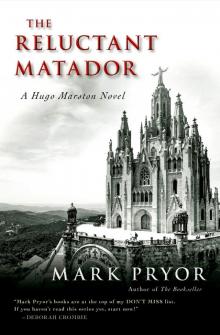 Hugo Marston 04 - The Reluctant Matador
Hugo Marston 04 - The Reluctant Matador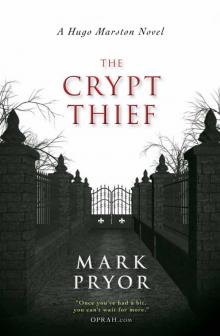 The Crypt Thief
The Crypt Thief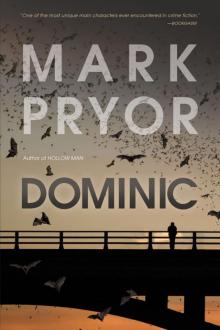 Dominic
Dominic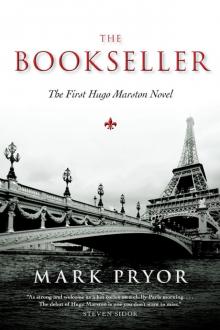 The Bookseller
The Bookseller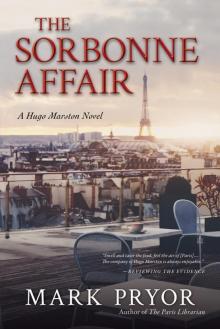 The Sorbonne Affair
The Sorbonne Affair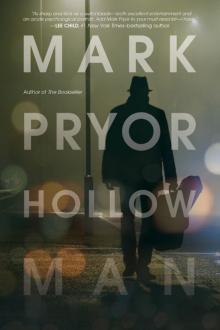 Hollow Man
Hollow Man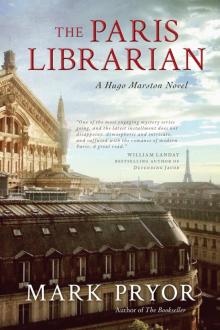 The Paris Librarian
The Paris Librarian